StrausCenterfor YoungChildren& Families 2024

Year in Review




School of Education, 1947 (1925 - 2023)

The Straus Center exists because of Lynn Straus’s generosity. Mrs. Straus was a Bank Street alumna, former trustee of the College, and champion of early care and education.
Without her pedagogy, leadership, and advocacy, infant-toddler programs, Head Start, state preschools, and kindergartens would not exist as we know them (see Remembering Visionary Educator Lynn Straus, link).
Mrs. Straus's life and work are the basis for how we represent Bank Street in early childhood research and policy spaces.
Every project we engage in is guided by the question: What would Mrs. Straus think of our work?
$324K
$4.2M
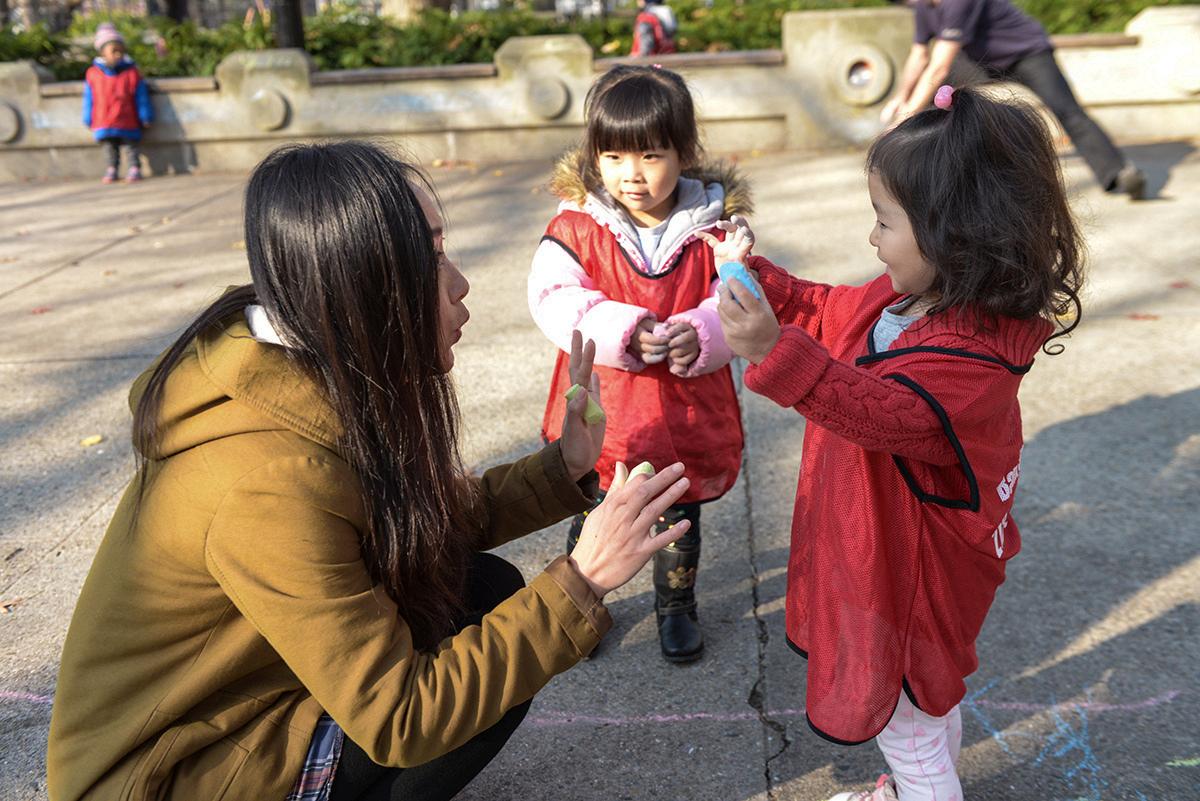
CURRENT GRANTS
3
PROPOSALS UNDER REVIEW INTERNAL COLLABORATIVE PROPOSALS
$179K
SUPPORT TO THE GRAD SCHOOL & COLLEGE
45% RESEARCH ACCESSED
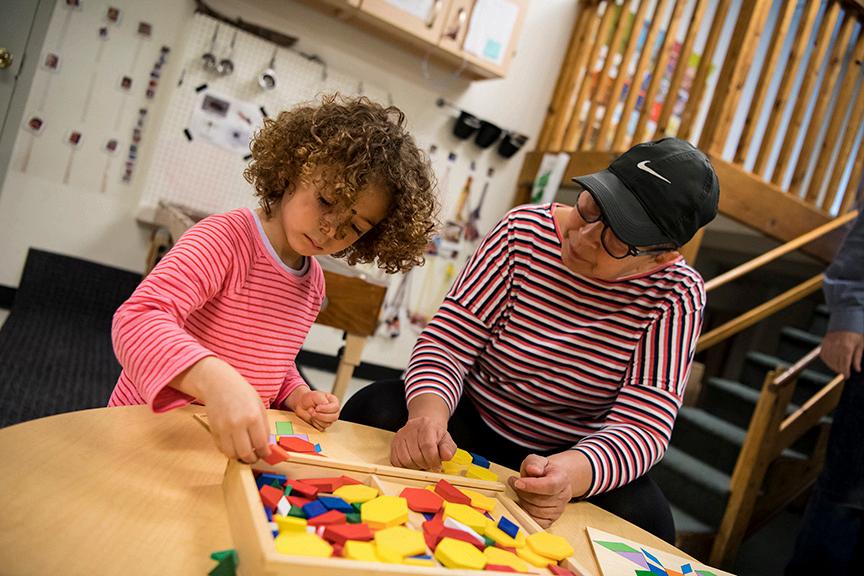
THE CENTER EXISTS TO ADVANCE BANK STREET'S MISSION AND CREDO THROUGH 3 CORE ACTIVITIES:
Participatory, equity-committed research
Ground-up policy analysis
Synthesizing and promoting research-based practices
These are in keeping with Bank Street’s founding principle of using research to inform teaching practice, policy making, and justicecentered social reform.
This work sits at the nexus of practice-based evidence, evidence-based practice, and the War on Poverty's yet-to-be-realized value of "maximum feasible participation."
"OUR CREDO DEMANDS
ETHICAL STANDARDS AS WELL AS SCIENTIFIC ATTITUDES."
– BANK STREET CREDO

Science is not, and has never been, neutral
Rejection of methodological rigor (rigidity) and an embrace of empirical vigor
Commitment to the scholarship of generosity
Mobilizing social capital
The College was created with faith in science’s ability to ameliorate social problems through study of the world However, this scientism also led to the concretization of race as a typology, social Darwinism, eugenics, and the application of factory-derived scientific management to schooling
This critical reflection tempers the Center’s overarching questions:
What is the progressive early care and education of the 21ST CENTURY? What does this look like, what are its outcomes (for whom), and how can we use the power of connections to share what we learn to advance social justice?

The current emphasis on professionalizing early childhood raises important questions in terms of what knowledge, orientations, and skills teacher candidates are expected to demonstrate; according to whom; how they experience this learning, where, and to what effects?
What is largely missing in these efforts are deep considerations of workforce diversities, structural marginalizations, and the importance of educators’ holistic well-being to equity-aspirations for children
SYSTEMIZATION FOR EQUITY 2
A corollary to professionalization is the US's fragmented administrative and higher education systems However, we take the hopeful stance that, while deeply structured inequities are real and feel intractable, systems have been made by people and, therefore,
can be redesigned and transformed with good information, social will, and persistent collective action We contribute to this by generating trustworthy knowledge on systemsbuilding efforts; facilitating crosspositional meaning-making about this work; and connecting allies.
EQUITY-CENTERED FAMILY & COMMUNITY ENGAGEMENT
In order to approach the vision of education for democracy, top-down efforts to professionalize and systematize early care and education must be guided by a commitment to democratizing these processes in an increasingly plural society.
As with the other two foci, our work must encompass more than seeking understanding of social phenomena and their outcomes but also using these empirical lessons to promote educators' and policy makers' critical reflection and action WITH children and their families.
GO-TO
As the College re-engaged with post-pandemic strategic planning, we evaluatively reflected on the center's initial 2020-2023 plan. This included a reanalysis of the 2020 environmental scan, which revealed that New York lacks an academic institution focusing exclusively on early care and education (ECE) research. The following strategic actions move us towards the longer-term vision of becoming a go-to source for ECE research in New York and, in so doing, extend the College’s influence.
MS Ed in Early Childhood Leadership
Both the Organizational Development and Education Law, Policy, and Advocacy courses focus on questions of how to create nurturing
ECE school cultures and climates for everyone and how to analyze policies and advocate for transformed systems that will nurture and sustain this work.
Support from leaders, The Listening to Teachers Study
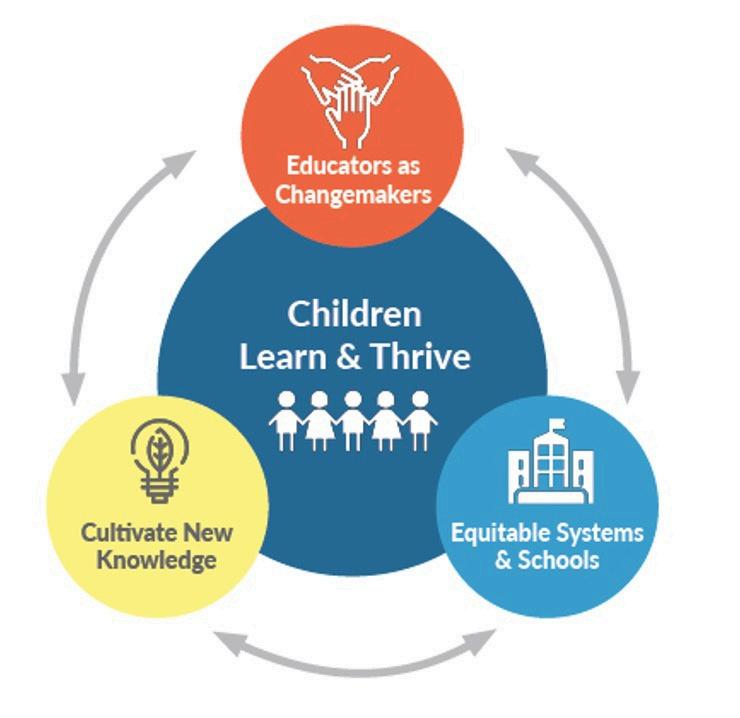
and coaches reduced burnout and increased thriving (link) Where is this happening?
What does this look like?
How can we understand, expand, and support these practices?
Our research and teaching informs Engaging Decision Makers how we engage with ECE decision-makers in New York City and State government, professional organizations, and advocacy groups.
For further details, see the appendices



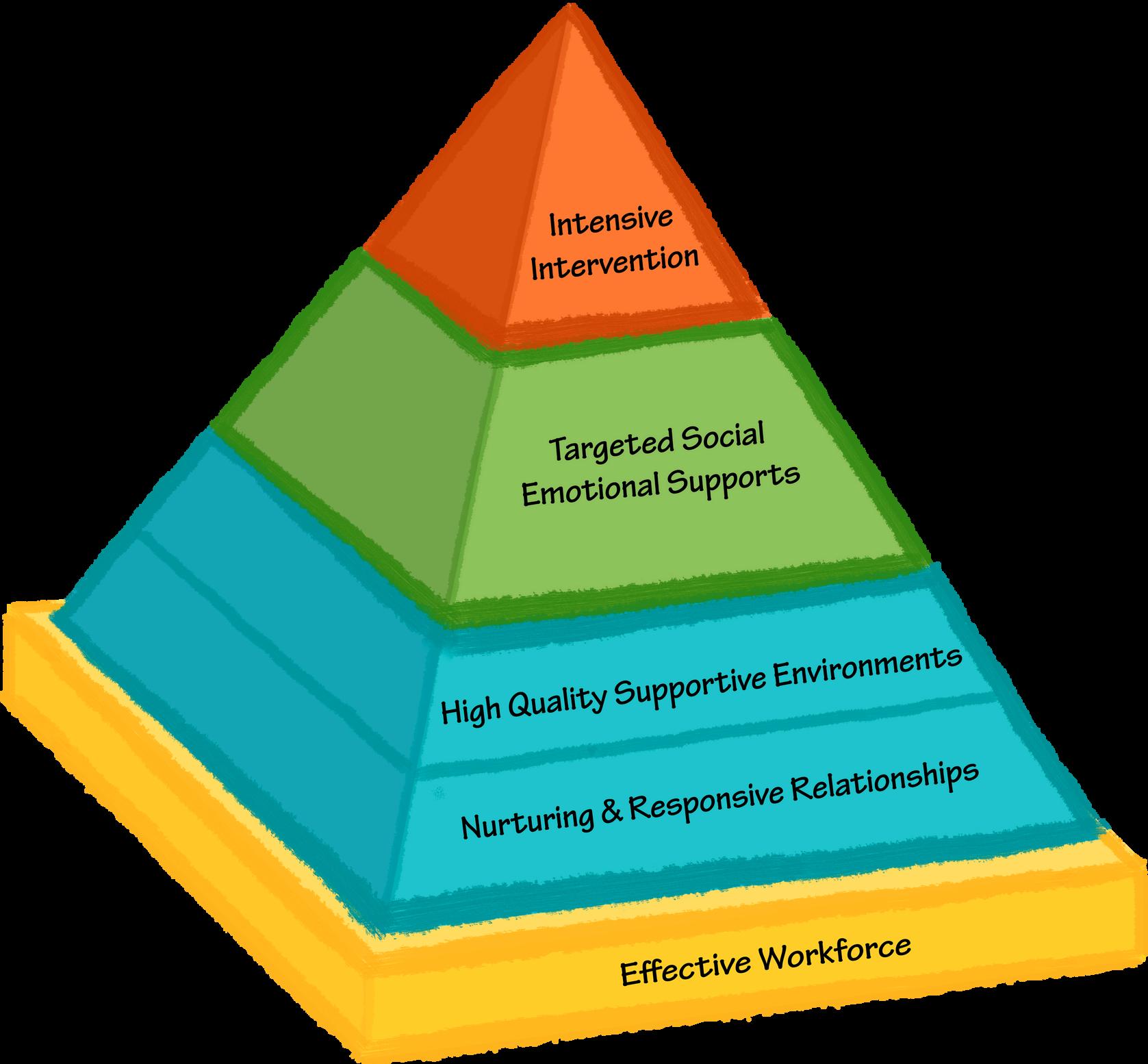

Typically, policy research is viewed in terms of implementation, cost-benefits, and outcomes. We aim to engage in that research as well; however, our value proposition involves inquiring into how policies and systems are interpreted, expressed, and experienced by people in systems’ strata: administrative agencies, schools, community organizations, and in communities themselves.
This map shows some of our current (full color) and prospective (faded) projects across the state

Funded by the Foundation for Child Development and Bethpage Foundation, this project investigates re-imagining pathways to college degrees for Latina family child care professionals This includes redesigning advising, developing coursework in Spanish, and contextualizing this work within Long Island’s ECE system-functioning, for which an additional proposal is under review by the US Department of Health & Human Services.
New York City Early Childhood Research Network: Teachers’ WellBeing, Systemic Inclusivity, and Teacher-Child-Parent Relationships
New York Hall of Science: Espacio: Comunidad y Familias (Corona)
New York State Head Start Association: Understanding Perspectives on Expanding Access to Early Head Start Across NY
US Department of Health & Human Services: New York State Pyramid Model Experiences Study
Robin Hood Foundation: Bank Street Education Center’s Early Childhood Workforce Collaborative (NYC)


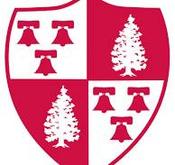
Dutchess Community College District: Early Childhood Expansion (with Poughkeepsie Children’s Cabinet)
US Department of Education: REAL Learning (ERP + Translanguaging on Long Island and in the Hudson Valley)
National Science Foundation: Engaging NJ/NY Early Childhood Educators in Computational Thinking (with Montclair State University)










A key publication this year was Issue 51 of the Bank Street Occasional Paper Series: Reconceptualizing Quality Early Care and Education with Equity at the Center The collection’s 15 authors, including faculty affiliate Soyoung Park, provide hopeful examples of culturally, linguistically, and disabilities-affirming practice. As with 2023's book, Transforming Early Years Policy in the U S , OPS #51 was as much about building the Center’s scholarly network as it was about sharing information.
Unique Institutions
Countries
Research Accessed, 2020-2024
Source: Bank Street Educate
Research Accessed
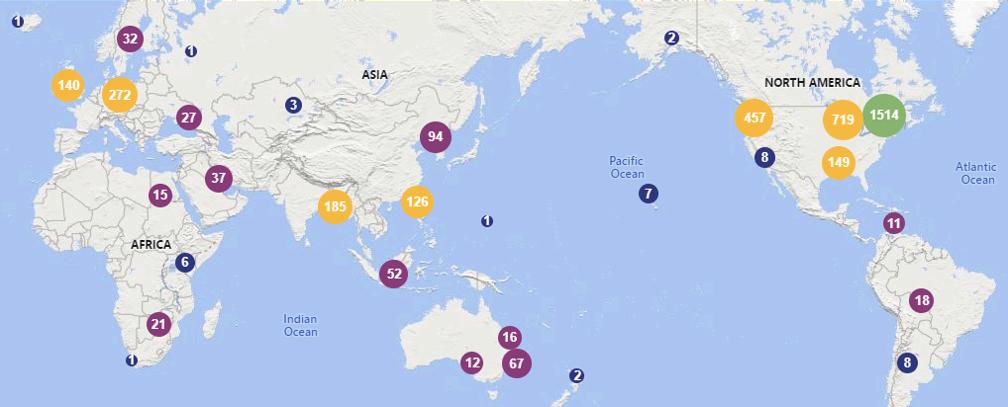
Source: Bank Street Educate
Fully-realized scholarship braids research, teaching, and service (to the college, community, and profession). This ethos further ties together our work.
1.1 Contribute to an institutional culture that fosters disciplined inquiry, knowledge generation, and application
1.2 Work to further integrate our scholarship with academic programs, alumni relations, Children’s Programs, and the Education Center
Evidence: codified policies & procedures documented internal partnerships with faculty, alumni, and students (#) students, individualized study/ integrative masters projects (#) partnership proposals (#) shared funding ($)
Service to the College Institutional Research Board, Occasional Paper Series Editorial Board, Integrative Masters Project Committee, College Advisory Council, Academic Programs Committee (Board of Trustees)
Teaching
Organizational Development (ECE) Law, Policy & Advocacy (ECE)
Parents are a Child’s First Teacher (collaborative student-faculty inquiry)
ECE “Quality”: What does it look like through an equity lens? (collaborative student-faculty inquiry)
2024
Active Internal Collaborations
Espacio: Comunidad y Familias (New York Hall of Science) with GSE alumni: Jasmine Maldonado (‘10 & ’14), Delia Meza (‘20), and Sarah Ketani ('16) and the Bank Street College Alumni Association (BSCAA)
Teacher-Child Relationships with the National Center for Children in Poverty Bank Street Early Childhood Workforce Collaboration with the Education Center
Prospective Internal Collaborations
Responsive Emotional and Language Learning (USDOE Education Innovation and Research), with the Center on Emotionally Responsive Practice, National Center for Children in Poverty, and GSE faculty
Support to NYC Public Schools Serving Migrant Students (Spencer Foundation), with the Center on Emotionally Responsive Practice, National Center for Children in Poverty, and GSE faculty Advancing Early Childhood Computer Science Education: Theory, Practices, and Pathways Forward (National Science Foundation) with Montclair State University and educators from the Bank Street Head Start and School for Children
2.1 Diversify our funding portfolio to include city, state, and federal grants, contracts, and cooperative agreements
2.2 Increase participatory and convivial scholarship
2.3 Increase projects with students, faculty, staff, alumni, and external stakeholders, with a focus on New York
Evidence: partnership proposals (#) proposed/awarded funding ($) sponsorship of core staff time (%, trend) funding sources/type (%, trend) indirect costs recovered ($, trend) documented partnerships, by group (#) internal/external projects (#) projects/agenda-area (%) student/faculty participation (#)
Key Proposals
A 5 Nation Study of ECE Systems
Development $3.2 M (Spencer Foundation)* Engaging NJ/NY Early Childhood Educators in Computational Thinking $200K (National Science Foundation)*
Proposals:Funding(millions)
SY2024 Awards to Date: $95K
Of the over $4 million in grant proposals (8) under review, 3 are federal (USDOE, NSF and OPRE), an increase from the 1 federal subgrant received in SY2023
A Mixed Methods Analysis of Infant-Toddler Access to Care on Long Island $833K (Office of Planning, Research & Evaluation)* REAL Learning (US Department of Education)*
* in partnership
3.1 Diversify how we share our scholarship with general, policy, and academic audiences
3.2 Increase participation in local, regional, national, and international scholarly, practice, and policy spaces (with a primary focus on New York)
3.3 Local, regional, national, and international convening
Evidence: pieces, by type/audience (# / %)
Educate usage (#, trend) documented partnerships by group (see goal 2)
documented participation, by strata (#) documented activities/partners (#) students (#)
Teaching: Doctoral Committees
Kate Connor, Ph D (Erikson Institute)
Mary Quest, Ph D (Erikson Institute)
Zhu Xiaohan (Fordham University)
Rachel Comly (Rutgers University)
Erika Yardy (Teachers College)
Liran Laor (University of Maryland)
Key Presentation
How participatory are our participatory approaches? A “popup community of praxis ” American Educational Research Association
2024
Publications
Reconceptualizing early childhood quality with equity at the center, Bank Street Occasional Paper Series 51
Examining the ecology of preschool inclusion in New York City (Sarika Gupta, 1st author), Contemporary Issues in Early Childhood
Convenings
Across the Bridges at NYSCI (with BSCAA)
Childcare Equity (with the University of North Texas)
Bank Street College Equity Series: Educating the Newest New Yorkers (GSE)
Reflecting on Creative Curriculum Implementation in NYC (with Hunter and Brooklyn Colleges)
Service
Pyramid Model Data Workgroup; New York Association for the Education of Young Children (board); New York Association of Early Childhood Teacher Educators (board); East Harlem Block Nursery (board); Reviews for: Harvard Education Press; Journal of Early Childhood Teacher Education; Early Childhood Research Quarterly; European Early Childhood Research Journal; US Office of Planning, Research & Evaluation
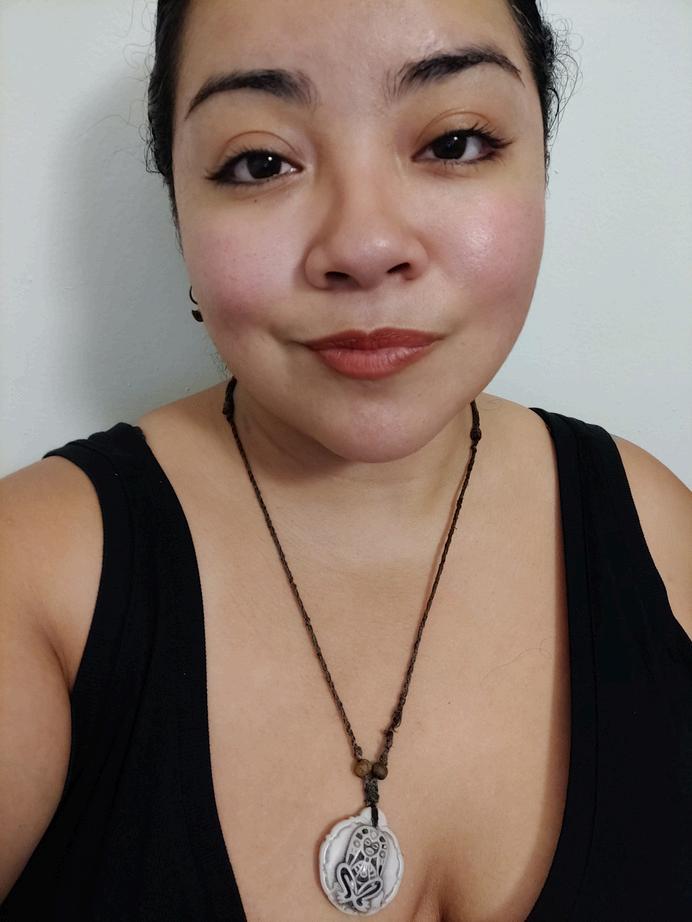

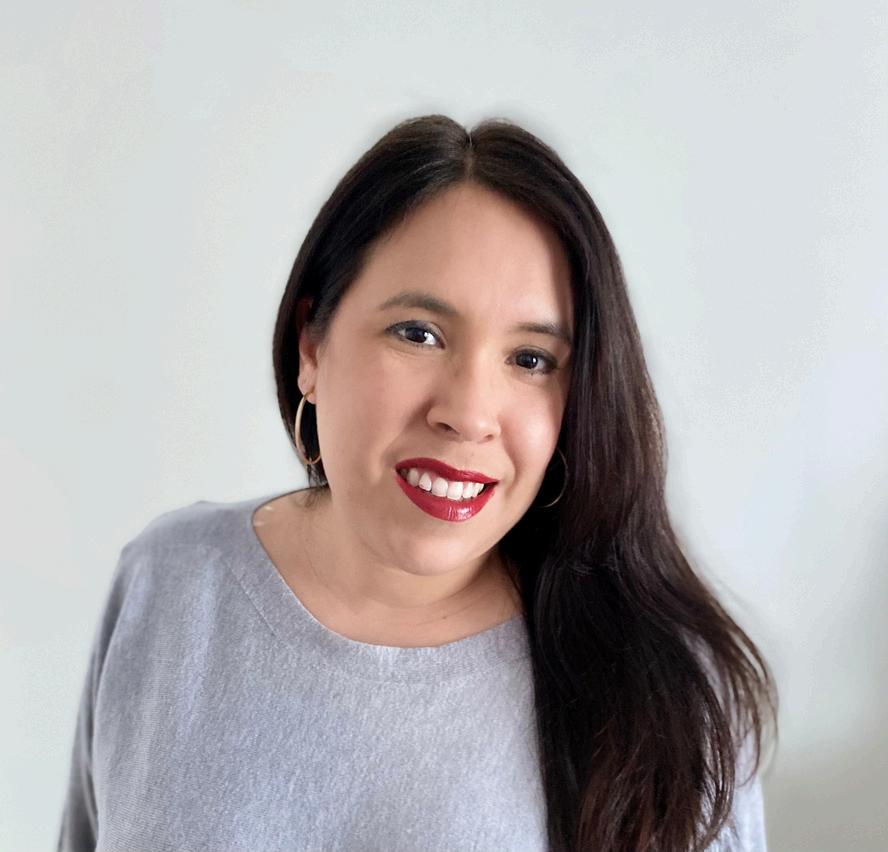



THANIA GÓMEZ-MARTÍNEZ, BA
research assistant
Thania's scholarship blends her rich background in sociology, crisis intervention, and community work to study and advocacy within Latine communities and their intersectionalities
SARIKA GUPTA, PHD
senior researcher
Sarika’s research and practice center around the belief that all children, regardless of their abilities, have the right to access and feel belonging in general education settings
CRISTINA MEDELLIN, PHD
associate director
As a bilingual/bicultural developmental psychologist, Cristina applies a critical lens in her research that uplifts and affirms communities of color
director
Mark's work is grounded by being the child of a Head Start teacher-mom whose career began as a volunteer in his classroom MARK NAGASAWA, PHD
SOYOUNG PARK, PHD
affiliated faculty
Soyoung engages in community-based research partnerships with educators to interrogate the ways in which racism, ableism, and xenophobia manifest in educational spaces and to promote more humanizing, liberatory experiences for children, families, and teachers
XIAOHAN ZHU, MA
research assistant
Xiaohan is passionate about understanding immigrant families' social ecologies and how culturally-based family practices should inform educational policies
